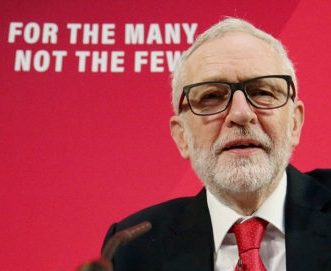Boris Johnson’s talk of restoring sovereignty is a lie. He is handing democratic power to economic elites, not the people. George Monbiot writes in the Guardian 14th October 2020.
The question that divides left from right should no longer be “how big is the state?”, but “to whom should its powers be devolved?”. In his conference speech last week, Boris Johnson recited the standard Tory mantra: “The state must stand back and let the private sector get on with it.” But what he will never do is stand back and let the people get on with it.
The Conservative promise to shrink the state was always a con. But it has seldom been as big a lie as it is today. Johnson grabs powers back from parliament with both fists, invoking Henry VIII clauses to prevent MPs from voting on crucial legislation, stitching up trade deals without parliamentary scrutiny, shutting down remote participation, so that MPs who are shielding at home can neither speak nor vote, and shutting down parliament altogether, when it suits him.
He seeks to seize powers from Scotland, Wales and Northern Ireland: the internal market bill appears to enable Westminster to take back control of devolved policies. He imposes the will of central government on local authorities, refusing to listen to mayors and councils while dropping new coronavirus measures on their cities. He claws back powers from the people, curtailing our ability to shape planning decisions; shutting down legal challenges to government policy; using the Coronavirus Act and the covert human intelligence sources bill to grant the police inordinate power over our lives.
His promises to restore sovereignty are lies. While using the language of liberation, he denies power to both people and parliament. He promised to curtail the state, but under his government, the state is bursting back into our lives, breaking down our doors, expanding its powers while reducing ours.
Instead, he gives power away to a thing he calls “the market”, which is a euphemism for the power of private money. This power is concentrated in a small number of hands. When Johnson talks of standing back and letting the private sector get on with it, he means that democratic power is being surrendered to oligarchs.
Under the Conservatives, the state shrinks only in one direction: to make room for money and privilege. It grants lucrative private contracts to favoured companies without advertisement or competitive tendering. It gifts crucial arms of the NHS to failed consultants and service companies. It replaces competent, professional civil servants with incompetent corporate executives.
We need a state that is strong in some respects. We need a robust economic safety net, excellent public services and powerful public protections. But much of what the state imposes are decisions we could better make ourselves. No Conservative government has shown any interest in devolving genuine power to the people, by enabling, for example, a constitutional convention, participatory budgeting, community development, the democratisation of the planning system or any other meaningful role in decision-making during the five years between elections.
The Labour party’s interest in these questions is scarcely more advanced. The 2019 manifesto talked of “urgent steps to refresh our democracy”. It called for a constitutional convention and the decentralisation of power. But these policies were scarcely more than notional: they lacked sustained support from senior figures and were scarcely heard by voters. During his bid to become Labour leader, Keir Starmer announced that “we need to end the monopoly of power in Westminster”. He called for “a new constitutional settlement: a large-scale devolution of power and resources”. Since then we’ve heard nothing.
When challenged on its policy vacuum, Labour argues that “the next general election is likely to be four years away … There’s plenty of time to do that work.” But you can’t wait until the manifesto is published to announce a meaningful restoration of power to the people, and expect it to be understood and embraced. The argument needs to be built – and Labour local authorities, by developing powerful examples of participatory politics, need to show how Starmer’s promised new settlement could work. Instead there’s a sense that the parliamentary Labour party still sees its best means of enacting change as seizing a highly centralised system, and using this system’s inordinate powers to its own advantage.
For many years, Labour relied on trade unions for its grassroots dynamism and legitimacy. But while the unions should remain an important force, they can no longer be the primary forum for participatory politics. Even at the height of industrialisation, when vast numbers laboured together in factories and mines, movements based in the workplace could only represent part of the population. Today, when solid jobs have been replaced by dispersed and temporary employment, and many people work from home, the focus of our lives has shifted back to our neighbourhoods. It is here that we should build the new centres of resistance and revival.
Starmer has so far shown little interest in reigniting the movements that almost propelled Labour to power in 2017. But even if Labour wins an election, without a strong grassroots mobilisation it will struggle to change our sclerotised political system. Any radical political project requires a political community, and this needs to be built across years, not months.
The popular desire to take back control is genuine. But it has been cynically co-opted by the government, which has instead passed power from elected bodies to economic elites. The principal task of those who challenge oligarchic politics in any nation is to offer genuine control to the people, relinquishing centralised power and rewilding politics. Yes, the state should stand back. It should stand back for the people, not for the money.
• George Monbiot is a Guardian columnist


